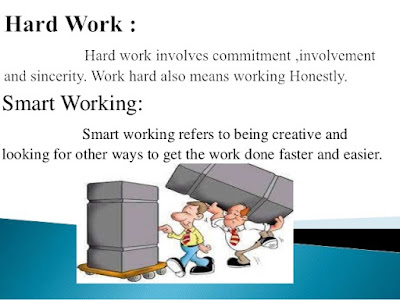Do not work hard but smart is an age-old proverb, which lays stress in working smartly rather than through hard means within the given time.
However, it’s very tough to find very clear guidelines on what working smart really means and how it is different from hard work.
Many people work hard but only a few become really successful due to their smart work. Smart work is behind every successful entrepreneur or employee and as such smart work always brings in positive results. Whereas hard work induces stress and work-related complications.

Recent statistics have shown that in the United States about 85.8% of males and 66.6% of females work hard and the United States remains an only industrialized country in the world with no legally mandated annual leave.
Younger generation such as millennials is growing up on the doctrine of “smarter not harder” by trusting technology and prioritizing time efficiency. Being smart is a useful thing to inherit and working smart is essential as the most successful people work smart.
How to Work SMART
In this technological era adopting a right combination of time management skills can cut stress levels in addition to saving time and being more efficient. The following five tips can help you work smartly and be more productivity in your work.

Use Technology to Get Organized
There are numerous technology gadgets and software programs that can help you in organizing your work profile. Adopting personal scheduling programs that allow you to keep a calendar, to-do-lists, work plans and directory of contacts would help in completing your tasks on time.
Delegating The Work
There are other people/employees or colleagues that are capable of handling some of the tasks that you generally reserve for yourself.
Therefore, it is important to consider which duties or work you could be sharing with others. Delegating your work will allow you to focus on your high priority work or tasks while giving your colleagues/co-workers or employees a chance to grow and enhance their career prospects.
Stop Multitasking
According to neuroscientists people cannot multitask very well as the brain is good at deluding itself. The human brain has to struggle much when multitasking as you are not paying attention to one or two things simultaneously but switching between them rapidly.
Therefore, it is better to stop multitasking and focus on one thing or work that needs to get done right now.
Take Frequent Mini-breaks
Research shows that taking mini breaks or naps lead to improvement in cognitive function, creative thinking, and memory performance.
Briefly stepping away from your work will relax your body and rejuvenate your mind thereby relieving workplace stress. Effective stress management techniques would help in finishing your tasks on time and with success.
Work With a Positive State of Mind & Attitude-
Working with a positive state of mind at work will help you set standards for your work and ensures in taking responsibility for yourself and in making decisions easier ever since they are based on your intuition.
Therefore, it is important to have a positive attitude to work smart rather than harder.
The Advantages of Smart Work
In this modern era of technology working smartly is the prerequisite for achieving success. The advantages of working smart includes
Smart work improves productivity.
With smart work, anybody acquires time management skills.
Smart work enables to concentrate on work more effectively.
Smart work helps in tackling the issues with impunity.
With these advantages in place, working smart is a necessity rather than a choice in these days of innovative technologies.













